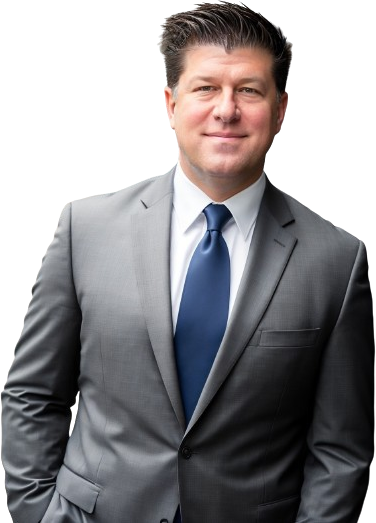
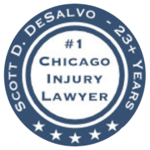

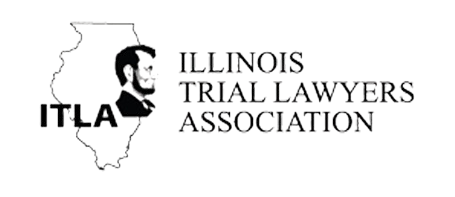
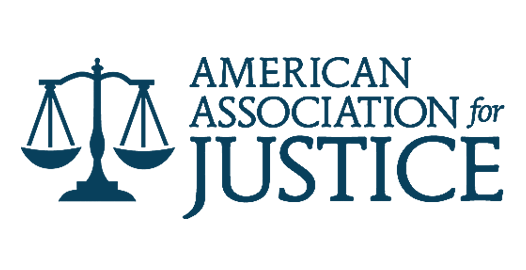
I still remember the call I got three winters ago from a grandmother in Lincoln Park. She was crying.
Her seven-year-old granddaughter had been playing at a playground in Rogers Park when she slipped on ice near the swing set. The little girl hit her head hard. Really hard. She spent three days in the hospital, and the doctors were worried about long-term effects.
The grandmother kept saying "I should have checked the ground first. This is my fault."
But it wasn't her fault. Not even close.
That playground owner knew about the ice. Other parents had complained about it for days. They just didn't want to spend the money to salt it properly. And now a little girl was hurt because of their negligence.
We ended up recovering over $800,000 for that family. But more than the money, I wanted that grandmother to understand something important: property owners in Chicago have a legal responsibility to keep people safe. When they don't, they need to answer for it.
If you've been hurt in a slip and fall accident anywhere in Chicago, you're dealing with a lot right now. Physical pain. Medical bills piling up. Maybe you can't work. And on top of all that, you've got insurance companies telling you it's your fault or that you don't deserve compensation.
I'm here to tell you: that's garbage.
Whether you slipped on ice outside a Loop office building, fell on a wet floor at a River North restaurant, or tripped on broken pavement in Pilsen, Illinois law gives you the right to hold negligent property owners accountable.
I've been handling these cases all over Chicago for years. The Gold Coast. Hyde Park. Englewood. Wicker Park. South Shore. Bridgeport. Every neighborhood has property owners who cut corners on safety, and every neighborhood has people who get hurt because of it.
Here's my promise to you, and I mean this: you don't pay a penny out of pocket. You don't pay me unless we win. And you can call me any time—literally any time, day or night, weekends, holidays, middle of the night—I don't care. If you need to talk, I'm here.
Let me walk you through what you need to know about slip and fall cases in Chicago. No legal jargon. No BS. Just straight talk about your rights and how to protect them.

Alright, so "slip and fall" sounds pretty straightforward, right?
You slip. You fall. Pretty simple.
But here's the thing: these cases are anything but simple. And they're definitely not minor.
I've represented clients with broken hips who needed surgery and months of rehab. People with fractured wrists that required pins and screws. Back injuries that still cause pain years later. Head trauma from hitting concrete. These are life-changing injuries.
A slip and fall case happens when you get hurt on someone else's property because they didn't keep it safe. Could be ice they didn't salt. Could be a wet floor without warning signs. Could be broken pavement they knew about but never fixed.
Chicago's weather makes things worse. Our winters are brutal—ice and snow everywhere. Property owners are legally required to deal with it. They have to salt their sidewalks and parking lots within a reasonable time. They have to maintain safe conditions.
But some don't. They'd rather save a few bucks than keep people safe.
And that's when people like you get hurt.
Under Illinois law, property owners owe you a duty to maintain safe conditions. When they fail, and you get injured, they're responsible. They can be held liable for your medical bills, lost wages, pain and suffering—all of it.
That's what I do. I hold them accountable.
Let me tell you something: these accidents happen way more often than people realize.
And they happen everywhere. Grocery stores. Restaurants. Office buildings. Apartment complexes. Parking lots. Sidewalks. You name it.
Here are the most common ways I see people get hurt:
Chicago winters are no joke. We get ice. We get snow. We get brutal cold.
Property owners know this. They're supposed to deal with it.
But some don't. They figure "it'll melt eventually" or "we'll get to it tomorrow." Meanwhile, people are walking on that ice. Slipping. Falling. Breaking bones.
I've handled cases where people slipped on black ice in Streeterville parking lots that hadn't been salted in days. People who fell on unsalted sidewalks in Wicker Park. Injuries on icy steps at Lakeview apartment buildings. Falls in the Loop business district where property owners just didn't bother with snow removal.
And you know what the insurance companies always say? "You should have been more careful."
That makes me so angry. Property owners have a legal obligation to maintain safe walkways. You shouldn't have to navigate an obstacle course just to walk into a store.
Indoor slip and fall accidents are just as dangerous as outdoor ones.
I'm talking about freshly mopped floors without warning signs. Spills that don't get cleaned up. Rain or snow tracked in during Chicago's wet seasons. Polished floors that become skating rinks.
Retail stores, restaurants, office buildings—they all have to maintain safe floor conditions. If there's a hazard, they need to fix it immediately or at least put up a warning sign.
But a lot of times, they don't. An employee mops a floor and doesn't put out a "wet floor" sign because they're too busy. A customer spills something and nobody bothers to clean it up for an hour. Rain gets tracked in and nobody addresses it.
Then you walk through, slip, and hit the ground hard.
Whose fault is that? Not yours.
Chicago has beautiful old buildings. I love this city's architecture.
But old buildings and old sidewalks need maintenance. And a lot of property owners don't want to spend the money.
So you get cracked sidewalks. Broken pavement. Uneven transitions between surfaces. Potholes in parking lots. Torn carpeting bunched up in hallways. Loose cables or debris on walkways.
These are tripping hazards. And when you trip on them and fall, the injuries can be severe.
I've represented people who tripped on broken sidewalks outside Pilsen storefronts. Falls from uneven pavement in parking lots. Trips on torn carpeting in office buildings. All preventable if the property owner had just maintained their property properly.
You can't avoid a hazard if you can't see it.
Inadequate lighting contributes to a lot of slip and fall accidents. Parking garages with half the lights burned out. Stairwells that are too dark. Exterior walkways with no lighting at all.
When property owners don't maintain proper lighting, you can't see hazards that would otherwise be obvious. And when you can't see them, you're more likely to slip, trip, or fall.
Building codes require adequate lighting for good reason. It prevents accidents. But some property owners ignore the rules until someone gets hurt.
Stairways are already dangerous. When they're poorly maintained or don't have proper handrails, they become even more dangerous.
I've handled cases involving broken stairs, stairs with uneven step heights, missing handrails, broken railings that gave way when someone grabbed them, and poorly designed staircases that violate building codes.
Handrails exist for a reason. They prevent falls. They help people maintain balance. When property owners skip them or let them fall into disrepair, people get seriously hurt.
Here's something important to understand: slip and fall accidents don't just happen to elderly people or people who aren't paying attention.
They happen to everyone. Young. Old. Athletic. Careful. Doesn't matter.
I've represented:
These weren't careless people. They were ordinary folks going about their day when a property owner's negligence caused them to fall and get hurt.
If it happened to you, it's not because you were careless. It's because someone didn't do their job in keeping their property safe.

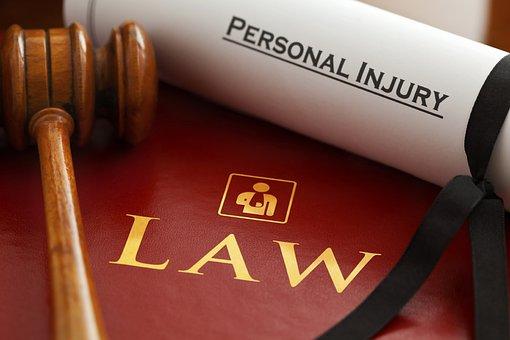

Let me be straight with you: slip and fall injuries are not minor.
When people fall, especially on hard surfaces like concrete or tile, the injuries can be catastrophic.
This is probably the most common injury I see. When you fall, your natural instinct is to try to catch yourself. That's when wrists and arms break. Or if you land on your side, you break a hip. Or if you fall backward, you can fracture your spine.
Hip fractures are especially serious for older victims. They often require surgery, extensive rehabilitation, and sometimes people never regain their full mobility.
Wrist fractures require pins, screws, and months of healing. Ankle fractures can affect your ability to walk normally. Compression fractures in the spine can cause chronic pain.
These aren't "minor" injuries. They're life-changing.
When you slip and fall, you often hit your head. Sometimes on concrete. Sometimes on the edge of a step. Sometimes on a hard floor.
Even what seems like a minor head bump can cause a concussion. More serious impacts can cause skull fractures, brain bleeding, or permanent brain damage.
I've had clients who seemed fine right after the fall but started having symptoms days later—headaches, dizziness, memory problems, personality changes. Those are signs of traumatic brain injury.
Head injuries are nothing to mess around with. Even if you feel okay after a fall, you need to see a doctor immediately.
Chronic back pain affects everything you do. Sitting. Standing. Walking. Sleeping. Everything.
Slip and fall accidents can cause herniated discs, spinal fractures, nerve damage, and in severe cases, paralysis.
Back injuries often don't heal completely. You might need ongoing treatment—physical therapy, pain management, injections, even surgery. And even with treatment, you might never feel the way you did before the accident.
Insurance companies love to minimize back injuries. They'll say "everyone has back pain" or "that's just part of getting older."
That's not true. And I don't let them get away with it.
Sprains. Strains. Torn ligaments. Torn tendons.
These injuries hurt. A lot. And they take months to heal, sometimes requiring surgery.
Shoulder injuries from falls are particularly common. You land on your shoulder or throw your arm out trying to catch yourself, and you tear your rotator cuff. That's surgery. That's months of physical therapy.
Knee injuries are also common—torn ACLs, torn meniscus, damaged cartilage. Again, surgery. Again, long recovery.
Don't let anyone tell you soft tissue injuries aren't serious. They are.

Every case is different, but Illinois law lets you recover both economic and non-economic damages.
Let me explain what that means in plain English.
Economic damages are your actual financial losses. Things you can add up and put a number on.
Medical Expenses: Every penny you've spent or will spend on medical care. Emergency room. Ambulance. Surgery. Hospital stays. Doctor visits. Physical therapy. Medications. Medical equipment. Future care you'll need.
I've had clients whose medical bills reached six figures after serious slip and fall accidents. And insurance companies try to claim some treatments "weren't necessary."
Your doctors decide what's necessary, not insurance adjusters.
Lost Wages: If your injuries kept you from working, you deserve compensation for every dollar you lost. Lost salary. Lost bonuses. Lost benefits. If you're self-employed, lost income from your business.
I work with your employer to document exactly what you've lost. For self-employed clients, I use tax returns and bank records to prove lost earnings.
Future Lost Earning Capacity: Serious injuries might mean you can't go back to your old job. Or maybe you can work but not at the same level. Maybe you had to take a lower-paying job because of your limitations.
You deserve compensation for that. Economists can calculate what your reduced earning capacity is worth—sometimes hundreds of thousands of dollars or more.
Out-of-Pocket Expenses: Any other costs related to your injury. Home modifications if you're disabled. Transportation to medical appointments. Help with household tasks you can't do anymore.
All of it counts.
Non-economic damages compensate you for losses that don't have a dollar value but are just as important.
Pain and Suffering: The physical pain you've endured and will continue experiencing. Illinois has no cap on pain and suffering in slip and fall cases.
This isn't just about the immediate injury. It's about chronic pain that affects your daily life. The frustration of not being able to do things you used to do. Living with discomfort every single day.
Emotional Distress: Anxiety. Depression. PTSD. Fear of falling again.
Many slip and fall victims experience lasting psychological effects. Especially after serious injuries or traumatic falls. That's real. That deserves compensation.
Loss of Enjoyment of Life: Not being able to do activities you love. Can't play sports anymore. Can't garden. Can't travel. Can't play with your kids or grandkids the way you used to.
Money can't bring those things back. But compensation at least acknowledges what you've lost.
Disfigurement and Scarring: Permanent scars affect how you feel about yourself. Especially visible scars. This impacts your confidence, your relationships, your life.
That deserves compensation.
Sometimes property owners act so recklessly that compensatory damages aren't enough.
That's when we go after punitive damages.
Punitive damages are designed to punish wrongdoers and send a message: you can't treat people's safety like it doesn't matter.
I pursue punitive damages when property owners showed willful disregard for safety, intentionally concealed known hazards, repeatedly ignored complaints about dangerous conditions, or prioritized saving money over keeping people safe in egregious ways.
When juries award punitive damages, property owners pay attention. And hopefully, they change their behavior so nobody else gets hurt.
Find Out What YOUR Case Might Be Worth...for free.
Let me be blunt: property owners and their insurance companies will use every trick they know to avoid paying what you deserve.
I've handled hundreds of these cases. I've seen every defense. I know their playbook.
Here's what to expect:
This is their go-to move. They'll claim:
It's victim-blaming at its finest. And it makes me angry every time.
Here's the truth: even if a hazard is somewhat visible, that doesn't always get property owners off the hook under Illinois law.
And even if you were partially at fault, you can still recover damages as long as you were less than 51% responsible.
Illinois uses "modified comparative negligence." If you were 30% at fault and the property owner was 70% at fault, you still recover 70% of your damages.
Don't let insurance companies bully you into thinking this was your fault. That's exactly what they want.
Property owners love to claim they had no idea there was a problem.
"We didn't know the floor was wet." "We didn't know that step was broken." "We didn't know there was ice on the sidewalk."
But Illinois law says they're liable for hazards they should have known about through reasonable inspection. That's called "constructive notice."
When I dig into maintenance records and interview witnesses, I usually find that the property owner was warned about the problem multiple times. They just didn't want to deal with it.
Sometimes they admit knowing about a hazard but claim they didn't have enough time to fix it.
This defense rarely works when I can prove:
If you know about a dangerous condition and don't fix it OR warn people about it, you're liable. Period.
Insurance companies hire doctors to dig through your medical records looking for any prior injury to the same body part.
Then they claim "see, this person already had back problems, so our client's negligence didn't cause their current pain."
I use medical experts who explain how the accident caused new injuries or made pre-existing conditions worse.
Illinois law says property owners must "take victims as they find them." If you had a prior back injury and their negligence made it worse, they're liable for making it worse.
You don't need perfect health to have a valid claim.
Insurance companies hire private investigators to follow you around, hoping to catch video of you doing something that looks inconsistent with your claimed injuries.
They also stalk your social media looking for photos of you smiling or doing activities.
Here's what you need to know: being injured doesn't mean you never smile or leave your house. Insurance companies take things wildly out of context.
A five-second video of you bending over to pick something up doesn't prove you're not in pain.
I build objective medical evidence—diagnostic imaging, expert opinions, treating physician testimony—that proves your injuries regardless of what some investigator captured on video.
Insurance adjusters make early, low offers hoping you'll accept before talking to a lawyer.
"We'll give you $10,000 to settle this right now."
Sounds good when you've got medical bills piling up, right?
But that $10,000 won't cover your medical expenses, let alone your lost wages, pain and suffering, and future medical needs.
And once you accept a settlement and sign a release, you can never get more money. Even if your injuries turn out to be worse than you thought. Even if complications develop. You get one shot.
Never—and I mean NEVER—accept a settlement without having a lawyer review it first.
Illinois law gives you two years from the date of your injury to file a personal injury lawsuit.
Two years might seem like a long time, but it's not.
Here's why: evidence disappears fast. Security footage gets erased. Witnesses move away or forget details. Property owners fix hazards to cover their tracks. Building a strong case takes time.
There are some exceptions to the two-year deadline:
For Kids: If the injured person is under 18, the clock doesn't start until they turn 18. So they have until age 20 to file.
For Government Property: If you fell on Chicago Park District property, CTA property, or other government property, you have different and SHORTER deadlines. You usually need to file a notice of claim within one year and sue within one year after it's denied.
Discovery Rule: In rare cases where injuries weren't immediately apparent—like certain toxic exposures—the deadline might start when you discovered or should have discovered the injury.
Here's what you absolutely must understand: if you miss the deadline, you lose your right to compensation forever.
Doesn't matter how strong your case is. Doesn't matter how badly you were hurt. If you file one day late, the court dismisses your case without even looking at it.
Don't wait. Don't procrastinate. Don't assume you have plenty of time.
Call me now.

Look, I'm not going to give you some slick sales pitch. That's not who I am.
But I want you to understand what makes my practice different from other Chicago injury firms.
When I was nine years old, my father was catastrophically injured at work. He was a truck driver, a Teamster, and the toughest guy I knew.
That injury changed everything for our family.
His case took 17 years to resolve. Seventeen years of being run around by insurance companies and defense lawyers. And at the end of those 17 years, his own lawyer sued him for more fees.
We grew up poor after my father couldn't work anymore. I watched my family struggle. I watched the legal system fail us.
That's why I became a personal injury lawyer. To make sure what happened to my father never happens to anyone else.
I know what it's like to be the family member of someone who's been hurt. The fear. The uncertainty. The financial stress. The frustration with insurance companies that don't care and lawyers who are more interested in their fees than your wellbeing.
That experience shaped who I am as a lawyer. It's why I treat every client like family. It's why I return phone calls. It's why I explain things in plain English instead of legal jargon. It's why I fight so hard.
Your fight is my fight. That's not just a slogan. It's the truth.
Most lawyers do the bare minimum for continuing education. They show up to a seminar, sit in the back, check the box.
Not me.
I've spent over $100,000 and thousands of hours on advanced training that most lawyers never even consider.
I'm a graduate of the world-renowned Gerry Spence Trial Lawyer's College. I'm a graduate of the prestigious "The Edge" program. Not one in 10,000 lawyers has completed the training I have.
Why did I invest all that time and money?
For one reason: so you get the very best, most cutting-edge and effective representation possible.
When I'm in a negotiation or courtroom, insurance companies and defense lawyers know I've trained with the best in the country. They know I'm not bluffing when I say I'll take a case to trial. They know I have the skills to win.
That knowledge makes them more likely to offer fair settlements. And when they don't, I'm fully prepared to take your case to trial and win.
Big firms handle hundreds or thousands of cases at once. You'll deal with paralegals, case managers, junior associates—everyone except the actual lawyer whose name is on the billboard.
I do things differently.
When you call my office, you talk to me. When you have questions, I answer them. I personally handle your case from start to finish.
I limit my caseload so every client gets real attention. You'll have my cell phone number. I'll return your calls promptly. You'll never wonder what's happening with your case because I'll keep you informed every step of the way.
Some people want the big firm with the fancy commercials. That's fine. But if you want a lawyer who actually knows your name and gives a damn about your case, call me.
Some lawyers settle cases cheap and fast because they want to move on to the next one.
That's not me.
I don't settle for less than your case is worth. When insurance companies make unreasonable offers, I'm fully prepared to take cases to trial.
My willingness to actually try cases gets us better settlements because insurance companies know I'm serious.
Property owners and their insurers respect lawyers who actually try cases. When they know you've hired an attorney who will go to trial if necessary, they take negotiations more seriously and make better offers.
I've stood in front of juries. I've argued for my clients' rights. I've won. And I'll do it again if that's what your case requires.
Let me be super clear about this: you pay nothing upfront. No retainer. No hourly fees. Nothing out of pocket.
I work on contingency. I only get paid if we win.
I even advance all case expenses—filing fees, expert costs, investigation expenses, medical record fees, everything.
If we don't recover money for you, you owe me nothing. Not a penny. Not for my time, not for the expenses I advanced, nothing.
This means anyone can afford experienced representation. You don't have to choose between getting a good lawyer and paying your bills.
In Workers Comp cases, my fee is the state-set 20%. In personal injury cases, it's 33⅓% or 40% if we have to go to court or trial. These are standard rates.
Pretty good deal, right? (Yes, that's my sense of humor creeping in.)
Accidents don't follow business hours.
You might fall on a Saturday night. You might be injured on a Sunday morning. Your accident might happen on Christmas Day.
That's why you can call me any time—24 hours a day, 7 days a week, 365 days a year.
Middle of the night? Weekend? Holiday? Doesn't matter. If you need to talk, I'm here.
Quick response matters because evidence disappears fast. Security footage gets erased. Witnesses forget. Property owners cover their tracks.
The sooner I get involved, the better positioned we are to protect your rights and build a strong case.
I'm not just a lawyer who works in Chicago. I'm part of this community.
I've supported local organizations throughout the city. I've sponsored youth sports teams in multiple neighborhoods. I've participated in safety initiatives to make our communities safer.
When I win slip and fall cases, I'm making Chicago safer for everyone. Every case sends a message to negligent property owners that cutting corners on safety has real consequences.
This isn't just business for me. It's personal. It's about making sure what happened to my father—and what happened to you—doesn't keep happening to other people.

The actions you take immediately after a slip and fall accident make a huge difference in your ability to recover compensation.
Here's exactly what to do:
Your health is the top priority.
Even if you think you're fine, see a doctor. Some serious injuries—head trauma, internal bleeding, spinal damage—don't show symptoms right away.
For severe injuries, go to the emergency room. For less serious injuries, see your doctor within 24-48 hours.
Beyond your health, this matters legally too. Insurance companies will claim "if they were really hurt, they would've gone to the hospital immediately."
Don't give them that argument. Get checked out right away.
Tell the property owner, manager, or staff immediately. Insist they create an incident report. Ask for a copy.
This creates a record before the property owner can claim ignorance or change their story.
Get:
If they refuse to document it, write down who you spoke to and what they said. That matters.
If you're physically able, photograph everything immediately.
The exact hazard that caused your fall. From multiple angles. The surrounding area. Your injuries. Your clothes and shoes. Weather and lighting. Anything that might be relevant later.
If you're too hurt to take photos yourself—and many of my clients are—ask someone with you to do it. Or have a family member go back as soon as possible.
Property owners fix hazards quickly after accidents. The evidence you capture right away might be the only evidence that exists later.
I can't tell you how many times insurance companies have claimed "the hazard wasn't that bad" only to have photos prove otherwise.
Get names and contact information from anyone who saw what happened.
Ask them:
Don't rely on the property owner to collect witness information. They'll conveniently "forget" to get details from witnesses who support your story.
Save the clothes you were wearing. Don't wash them right away. Keep damaged personal property.
I've had cases where torn clothing or damaged shoes helped prove exactly how an accident happened.
Also save:
Property owners and insurance companies will call asking for a recorded statement.
Politely decline. Say: "I'd prefer to provide a statement after I've talked to my attorney."
They're not trying to help you. They're building their defense by getting you to say something they can twist against you later.
Insurance adjusters are trained to ask questions in ways that hurt your case—even when you're telling the truth.
It's your legal right to decline. They can't hold it against you.
Insurance adjusters will ask you to sign medical releases, settlement agreements, or other documents.
Don't sign anything without having me review it first.
These documents often contain language that gives away your rights or hurts your case. Medical releases can be so broad they give insurance companies access to your entire medical history—not just records related to this accident.
Just say "I'd like my attorney to look at this first."
They'll push back. They'll say it's "standard" or "required."
It's not. Don't sign.
The sooner you hire me, the better I can protect you.
When you call right away, I immediately:
Don't wait weeks or months. Evidence vanishes. Witnesses forget. Security footage gets erased. Property owners cover their tracks.
Call me today. The consultation is free. There's no obligation. And you'll know exactly where you stand.
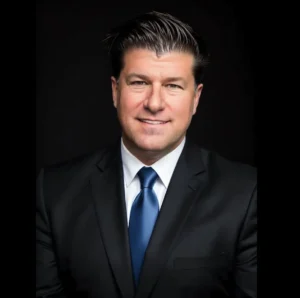
Let me answer the most common questions I get about slip and fall cases.
Illinois has something called "modified comparative negligence."
In plain English: you can still recover compensation if you were partially at fault, as long as you were less than 51% responsible.
Your damages just get reduced by your percentage of fault.
Example: Your damages are $100,000. If you were 30% at fault and the property owner was 70% at fault, you'd recover $70,000.
But if you were 51% or more at fault, you get nothing.
Don't assume you were at fault just because the insurance company says so. They always blame the victim. My job is proving the property owner's negligence was the main cause.
It depends on several things:
Simple cases might settle in a few months. Complex cases with serious injuries can take a year or more.
Here's my philosophy: I work efficiently, but I never rush just to close files. Your case deserves whatever time it takes to maximize your recovery.
I'd rather spend extra months building a stronger case and getting you more money than settling fast and leaving money on the table.
Every case is different. The value depends on:
I can give you a general estimate after reviewing your case, but honestly, we won't know the full value until we understand the extent of your injuries and complete our investigation.
Be suspicious of any lawyer who gives you a specific number in the first conversation. They're either guessing or telling you what you want to hear.
I'll give you a realistic assessment based on my experience with similar cases. But I won't make promises I can't keep.
This is a real concern, but there are often more options than you think.
Possibilities include:
I investigate all possible sources of recovery. Sometimes property owners claim they don't have insurance, but we discover they actually do. Or we find other liable parties who do have coverage.
Don't give up just because someone says there's no insurance. Let me investigate first.
Yes, but the rules are different and the deadlines are much shorter.
For accidents on government property—Chicago Park District, CTA, City of Chicago buildings—you typically must:
The notice requirements are strict. Miss the deadline or leave out required information, and you lose your right to sue.
Government liability cases also have damage caps in some situations.
If your accident happened on government property, call me immediately. We don't have time to wait with these cases.
If you were hurt at work, you're likely covered by Illinois Workers' Comp, which provides benefits regardless of fault.
But you might also have a slip and fall claim against a third party—like a property owner who's not your employer.
Example: You're a delivery driver who slipped on ice at a customer's business. You can get Workers' Comp benefits from your employer AND potentially sue the property owner.
These "third party" claims are separate from Workers' Comp and can provide much more compensation.
I handle both Workers' Comp and slip and fall cases, so I can evaluate all your options and maximize your total recovery.
Trespassers have limited rights, but not zero rights.
Property owners can't intentionally harm trespassers or set traps. And special rules protect child trespassers under the "attractive nuisance" doctrine.
The attractive nuisance doctrine says property owners must protect kids from dangerous conditions that might attract them—like swimming pools, construction equipment, or abandoned buildings.
Even if you were technically trespassing, call me to discuss your situation. The law is more complicated than just "trespassers have no rights." Depending on the circumstances, you might have a valid claim.
Never accept a settlement without having me review it first.
Insurance companies make early offers for one reason: closing your case cheap before you realize what it's worth.
These offers rarely account for:
Once you accept and sign a release, you can never get more money. Even if your injuries turn out worse. Even if complications develop. You get one shot.
Let me review any offer. The consultation is free. I'll tell you honestly if it's fair or if we can do better. Then you can make an informed decision instead of guessing.
You have the right to represent yourself. But consider this:
Insurance companies have teams of lawyers, adjusters, and investigators working to minimize your claim. They know the law. They know the tricks. They do this every day.
You want to go up against them alone?
Studies show injury victims who hire lawyers recover significantly more—even after paying attorney fees.
Plus, you're dealing with recovery. You're stressed. You're in pain. You're worried about bills. Do you really want to spend your time fighting insurance companies and learning slip and fall law?
Let me handle the legal fight while you focus on getting better.
The consultation is free. No obligation. At minimum, talk to me so you understand your rights. Then decide.
There is one particular injury lawyer I'd like you to call. I'll let you guess who that is. (Yes, that's my sense of humor creeping in.)
Hiring Scott was one of the best moves I have made in my life. Scott is a down to earth person and attorney. Scott is a 5 star first class act who really knows his stuff. The Judge said his presentation was one of if not the best he had ever seen. Take my advice, hire Scott I’m sure you’ll be 200% satisfied I was.

Scott not only cares about the case, but he truly cares about his clients and that makes him the best lawyer I have ever met and hired! He won my case! He is thorough in everything he does. I highly recommend Scott, and will always refer him to family and friends.

I hired Scott DeSalvo upon a friend’s recommendation. His office kept me informed of developments as they happened, and I felt the settlement reached was fair considering my injuries. I would highly recommend Scott DeSalvo to represent your personal injury case.

These accidents can happen anywhere. But some places are more common than others.
Wet floors from spills. Produce misting systems that make floors slick. Merchandise in aisles. Torn carpeting. Poor lighting.
I've handled cases at major chains and small local shops throughout Chicago. When stores don't maintain safe conditions, customers get hurt.
Spilled drinks. Greasy floors in kitchens that extend to dining areas. Wet entryways on rainy days. Uneven floor transitions. Dark lighting that hides hazards.
Restaurants have a responsibility to keep their premises safe for customers. When they don't, they're liable.
Icy sidewalks and parking lots. Broken stairs. Missing handrails. Poor lighting in hallways and stairwells. Wet lobby floors on rainy days.
Landlords and property management companies are responsible for maintaining common areas. When they fail, tenants and visitors get hurt.
Freshly mopped floors without warning signs. Torn carpeting. Loose cables. Cluttered walkways. Wet entryways.
Commercial property owners have a duty to maintain safe conditions for employees and visitors.
Potholes. Uneven pavement. Ice and snow. Poor lighting. Oil slicks.
These accidents often result in serious injuries because parking lots have hard surfaces and people are carrying things or not expecting hazards.
Chicago sidewalks can be dangerous. Cracked concrete. Uneven pavement. Ice and snow. Tree roots pushing up sections. Poor maintenance.
Property owners are responsible for maintaining the sidewalks adjacent to their property. When they don't, pedestrians get hurt.

When you hire me, here's what happens:
We talk about what happened. I listen to your story. Really listen. I ask questions to understand the full picture.
I explain your rights and options in plain English. No legal jargon. No pressure.
You decide if you want to hire me. Your choice.
If you hire me, I immediately start investigating.
I visit the accident scene to document conditions. I send preservation letters demanding the property owner preserve all evidence. I interview witnesses while memories are fresh. I obtain surveillance footage before it gets erased. I gather maintenance records, inspection reports, and any other relevant documents.
Time is critical. Evidence disappears fast. I don't waste a minute.
I work with your doctors to document your injuries thoroughly. I make sure your medical records clearly show the extent of your injuries and how they resulted from the accident.
I also coordinate with medical experts when necessary to explain complex injuries or prognosis.
Once I understand the full extent of your injuries and damages, I prepare a detailed demand package for the insurance company.
This package includes all evidence proving liability, complete medical documentation, economic loss calculations, and a demand for fair compensation.
I negotiate aggressively with the insurance company. I don't accept lowball offers. I push for full and fair compensation.
Many cases settle at this stage when insurance companies realize we have strong evidence and I'm serious about taking the case to trial if necessary.
If the insurance company won't offer fair compensation, I file a lawsuit.
Filing a lawsuit shows them we're serious. It often leads to better settlement offers as trial approaches.
During the lawsuit, both sides exchange evidence, take depositions, and build their cases.
This is where thorough preparation pays off. Insurance companies know I'll find everything they're trying to hide.
If we can't reach a fair settlement, I take your case to trial. I present your case to a jury. I argue for every dollar you deserve.
I've tried cases. I've won. And I'm ready to do it again if that's what it takes.

My practice serves clients throughout the Chicago metropolitan area.
All Chicago neighborhoods—Rogers Park, Lincoln Park, Lakeview, Wicker Park, Logan Square, Humboldt Park, West Loop, River North, Streeterville, Gold Coast, Loop, South Loop, Pilsen, Bridgeport, Bronzeville, Hyde Park, Englewood, Beverly, and everywhere in between.
Suburban communities across Cook County, DuPage County, Lake County, and Will County.
Whether your accident happened downtown near Millennium Park or in the suburbs, I'm here to help.
My office is conveniently located in Chicago—right across from the courthouse. But I'll meet you wherever is most convenient for you. Your home. A local restaurant. A coffee shop. Anywhere you feel comfortable.
Find out if you have a good case, or a tough one...for free!
Look, I'm not going to pressure you. That's not how I work.
I never chase clients. I never hustle and harass people. We talk like friends.
But if you've been hurt in a slip and fall accident, you deserve to know your rights. You deserve to know if you have a case. And you deserve to know your options.
Here's how it goes when you call:
Step 1: You call (or I can call you at a time that works for you).
Step 2: I listen to your story. Really listen. No interrupting, no judging, just listening.
Step 3: I answer your questions and address your concerns. Plain English, no legal jargon.
Step 4: I'll tell you honestly if I think you have a case and what I can do to help.
Step 5: You decide whether to hire me. Your choice. Zero pressure.
Step 6: Either way, we end up as friends.
Sound good?
You can reach me 24 hours a day, 7 days a week, 365 days a year at (312) 500-4500.
Or if you're not quite ready to talk, visit desalvolaw.com and tell me about your situation. I'll get back to you quickly.
Don't let a property owner's negligence destroy your financial security and quality of life. Don't let insurance companies push you around.
I look forward to hearing from you.
Your fight is my fight. Let's get you the justice and compensation you deserve.

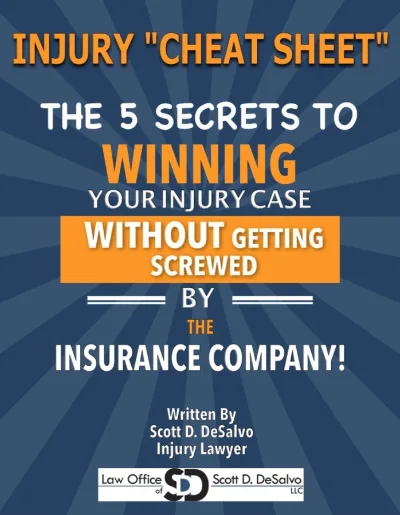

Scott DeSalvo founded DeSalvo Law to help injured people throughout Chicago and surrounding suburbs. Licensed to practice law in Illinois since 1998, IARDC #6244452, Scott has represented over 3,000 clients in personal injury, workers compensation, and accident cases.
No Fee Unless You Win | Free Consultation | 24/7 Availability Call or Text: (312) 500-4500
>>Read More
Main Office:
1000 Jorie Blvd Ste 204
Oak Brook, IL 60523
New Cases: 312-500-4500
Office: 312-895-0545
Fax: 866-629-1817
service@desalvolaw.com
Chicago and Other Suburban Offices
By Appointment Only